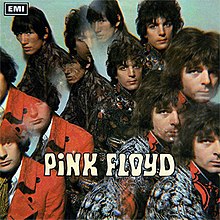| The Piper at the Gates of Dawn | ||||
|---|---|---|---|---|
 | ||||
| Studio album by | ||||
| Released | 4 August 1967 | |||
| Recorded | 21 February – 21 May 1967 | |||
| Studio | EMI, London | |||
| Genre | ||||
| Length | 41:54[3] | |||
| Label | EMI Columbia | |||
| Producer | Norman Smith | |||
| Pink Floyd chronology | ||||
| ||||
| Singles from The Piper at the Gates of Dawn | ||||
| ||||
The Piper at the Gates of Dawn is the debut studio album by English rock band Pink Floyd, released on 4 August 1967 by EMI Columbia.[7] It is the only Pink Floyd album made under the leadership of founder member Syd Barrett (lead vocals, guitar); he wrote all but three tracks, with additional composition by members Roger Waters (bass, vocals), Nick Mason (drums), and Richard Wright (keyboards, vocals). The album followed the band's influential performances at London's UFO Club and their early chart success with the 1967 non-album singles "Arnold Layne" and "See Emily Play".
The album was recorded at EMI Studios in London's Abbey Road from February to May 1967 and produced by Norman Smith. It blended Pink Floyd's reputation for long-form improvisational pieces with Barrett's short pop songs and whimsical take on psychedelia. The album made prominent use of recording effects such as reverb and echo, employing tools such as EMT plate reverberation, automatic double tracking (ADT), and Abbey Road's echo chamber. Part-way through the recording sessions, Barrett's growing use of the psychedelic drug LSD accompanied his increasingly debilitated mental state, leading to his eventual departure from the group the following year. The album title was derived from referencing the god Pan in chapter seven of Kenneth Grahame's 1908 children's novel The Wind in the Willows, a favourite of Barrett's.
The album was released to critical and commercial success, reaching number 6 on the UK Albums Chart.[8] In the United States, it was released as Pink Floyd in October on Tower Records with an altered track listing that omitted three songs and included "See Emily Play". In the UK, no singles were released from the album, but in the US, "Flaming" was offered as a single. Two of its songs, "Astronomy Dominé" and "Interstellar Overdrive", became long-term mainstays of the band's live setlist, while other songs were performed live only a handful of times. In 1973, The Piper at the Gates of Dawn was packaged with the band's second album A Saucerful of Secrets (1968) and released as A Nice Pair, to introduce the band's early work to new fans gained with the success of The Dark Side of the Moon (1973).
The album has since been hailed as a pivotal psychedelic music recording. Special limited editions of The Piper at the Gates of Dawn were issued to mark its 30th, 40th, and 50th anniversaries, with the former two releases containing bonus tracks. In 2012, The Piper at the Gates of Dawn was placed at number 347 on Rolling Stone magazine's list of the "500 Greatest Albums of All Time", moved up to number 253 in the 2020 edition.[9][10]
- ^ Cite error: The named reference
Billboard2006was invoked but never defined (see the help page). - ^ DeRogatis, Jim (2003). Turn on Your Mind: Four Decades of Great Psychedelic Rock. Hal Leonard Corporation. ISBN 1-61780-215-8. Archived from the original on 9 October 2013. Retrieved 1 August 2013.
- ^ a b Cite error: The named reference
AMwas invoked but never defined (see the help page). - ^ Perone, James E. (October 2012). The Album: A Guide to Pop Music's Most Provocative, Influential, and Important Creations. ABC-CLIO. p. 104.
- ^ Young, Rob (10 May 2011). Electric Eden: Unearthing Britain's Visionary Music. Farrar, Straus and Giroux. pp. 454–. ISBN 978-1-4299-6589-7. Archived from the original on 21 May 2021. Retrieved 20 October 2020.
- ^ Abrahams, Ian (July 2004). Hawkwind: Sonic Assassins. SAF Publishing. p. 17.
- ^ "Pink Floyd official site".
- ^ Cite error: The named reference
officialchartswas invoked but never defined (see the help page). - ^ Cite error: The named reference
rollingstone1was invoked but never defined (see the help page). - ^ "The 500 Greatest Albums of All Time". Rolling Stone. 22 September 2020. Archived from the original on 22 September 2020. Retrieved 24 February 2021.